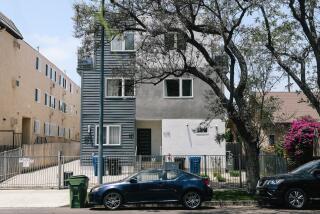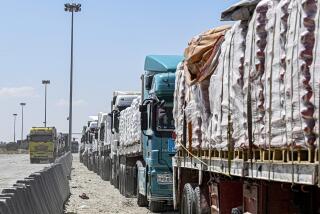Ethnic Discord : Upsurge in Militant Attacks Worries Foreigners in Egypt : Claiming Islam as a motive, radicals target tourists and banks.
- Share via
CAIRO — It is the kind of Saturday afternoon spring dreams are made of--lilacs sprouting along the roadside, the whiff of hot dogs from a makeshift stand. The Little League kids from Kodak are ahead by two runs; the thin and gloomy young pitcher from Sperry Sun International gets pulled. Parents heave a sigh of boredom in the stands as, at the edge of the playing field, a mosque begins droning the afternoon call to Muslim prayer.
This Little League game is being played in Egypt, where a new surge of Islamic militancy has made innocuous activities such as ballgames and cruises along the Nile sometimes seem an unnecessary risk.
Last week’s adult softball practice in the southern Cairo suburb of Maadi was canceled when the U.S. Embassy warned Americans to stay indoors after weekly high prayers. The British school has indefinitely put off field trips to Upper Egypt and the Egyptian Museum in downtown Cairo. The president of the American Chamber of Commerce in Egypt checks underneath his car for bombs before he gets in.
Cairo’s Yugoslav Serb community--part of a group that is uneasy everywhere in the Middle East since Serbs began fighting Muslims in Bosnia-Herzegovina--is especially edgy. A Serb was murdered in his Cairo apartment last year, and another recently left his embassy to find a note in his car. “We know who you are,” it said. “Go away.”
A wave of anti-Israeli demonstrations in Cairo after the massacre of about 30 Palestinians in a West Bank mosque has jangled the nerves of the roughly 100,000 foreigners of all nationalities living in Egypt, especially coming on the heels of a new warning from Islamic militants that foreign tourists and investors must either leave Egypt and withdraw their support for the government of President Hosni Mubarak, or die.
“I think everyone’s holding their breath,” said Gina Rae Speer, a Texan who has lived in Egypt since the early 1980s. “It’s gotten so that now I don’t even want to go out on the streets. . . . If things don’t improve in the next year, I will think about leaving--after living here for 11 years, and liking it very much.”
A young Slovenian mother at the Little League game expressed the growing sense of uncertainty among foreigners when she stared absently at the youngsters warming up on the field. “Where is safe? What is safe?” she said.
Foreign residents are not the only ones concerned. Tourism has plummeted, costing the country more than $1 billion in lost revenue, and the United Nations has expressed concern about sponsoring a conference on world population in Cairo in September.
Egyptian officials say that nearly two years after an upsurge in Islamic violence began in the dusty farming villages of southern Egypt, the arrest of thousands of suspected extremists and the execution of more than two dozen militants--all seeking to overthrow Mubarak’s government and install an Islamic state--have brought the problem under control.
But the last few weeks have brought an unnerving increase in the violence.
In the militant stronghold of Asyut in southern Egypt, several police officers are killed every week--sometimes one a day.
Small bombs have gone off at a number of Cairo banks, apparently to discourage foreign investment and to protest the payment of bank interest in contravention of Islamic law, which regards interest as usurious.
Tourist ships and buses cruising past the lush date groves and barley fields that line the banks of the Nile in southern and central Egypt have been shot at on several occasions by militants, who then run back into the fields and winding village streets to hide.
Four passenger trains running from Cairo to tourist destinations in the south have been attacked in the past two weeks, with six foreigners and 17 Egyptians wounded in hails of gunfire and in the explosion of a small bomb planted on one of the trains.
The underground Gamaa al Islamiya, or Islamic Group, said it launched the attacks to protest the recent death sentences issued against conspirators in a plot to assassinate Mubarak, and also as part of its continuing campaign against foreign tourism.
“Tourists should leave the country so as not to lose their lives amid the raging confrontation between the Gamaa and the oppressive regime in Egypt,” the group said in a statement faxed to news agencies, elaborating on a previous statement in which it warned all embassies, consulates and business people to advise tourists and investors to leave Egypt. “The next attacks will be extremely ferocious and strong,” it cautioned.
It is now impossible to enter a luxury hotel in Cairo without walking through a metal detector, particularly since a young musician dismissed by the government as mentally unstable and not linked to the Islamic movement walked into the elegant Semiramis Hotel in October and shot several diners in a restaurant. He was reportedly angered about the plight of Muslims in Bosnia.
Many foreign companies have taken down outside signs and implemented strict security procedures at job sites.
The atmosphere in traditionally friendly Egypt, one of the world’s foremost tourist destinations and America’s premier Arab ally in the Middle East, is increasingly being compared to that in Algeria, where Islamic violence has left more than two dozen foreigners dead since mid-September.
“Egyptians are not known to have the brutal nature attributed to many Algerians, but as the last two years have shown, there are radical elements in Egypt willing to shoot foreigners for the sake of their cause,” wrote a columnist in the English-language Middle East Times. “Egypt is a much more cosmopolitan place than Algeria, and this should be a protection for foreigners living here. But precautions should be taken.”
The U.S. Embassy sponsored a town hall meeting last month to answer questions from the American community and advised avoiding certain areas, remaining inconspicuous and “paying particular attention to any indication of surveillance.”
Robert O’Brien, the embassy’s senior security officer, was quoted as saying in the off-the-record session that the Gamaa’s recent warnings have been “much more explicit” than previous threats. “They have no credibility unless they fulfill this threat. That is my concern,” O’Brien said, adding, “This is a safe place to live, but it could be changing.”
Accordingly, people are being more careful. “Before, my kids would go out, and they might tell me where they are going and they might not. Now, I make sure I know where they are,” said one American businessman.
Though increasingly watchful, few foreigners are panicking. New foreign investment may be discouraged, seriously threatening Egypt’s economic restructuring program, but banks and businesses already here say they have no plans to change their operations as a result of the threats.
*
Most foreigners say they believe they have nothing to fear from the majority of Egyptians.
“The media writing stories about all this does a real disservice to Egypt, because it brings the country to its knees. It’s not any different from what goes on in the U.S.,” said one American businessman, a resident of Egypt for the past four years. “I feel safer here than I would in Harlem or Miami Beach.”
Several Americans said they have been approached apologetically by their Egyptian neighbors, who deplore extremists’activities.
“When there’s an act perpetrated here, the Egyptians will run after the guy who did it, whereas in Algeria they’ll just stand there and watch,” said James Pringle, president of the American Chamber of Commerce in Egypt.
“As president of the American Chamber of Commerce of Egypt, I am not prepared whatsoever to tell an investor that the security situation in Egypt is unsafe, go elsewhere. Absolutely not. If you look at the sheer number of foreigners who have been killed in Egypt, it doesn’t amount to one bad day in Washington or New York or Miami,” Pringle said.
More to Read
Sign up for Essential California
The most important California stories and recommendations in your inbox every morning.
You may occasionally receive promotional content from the Los Angeles Times.













